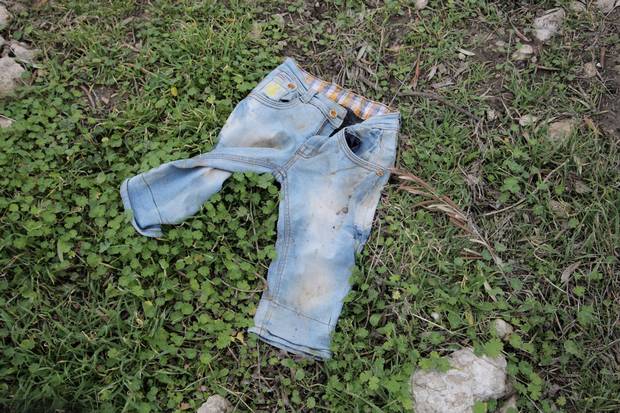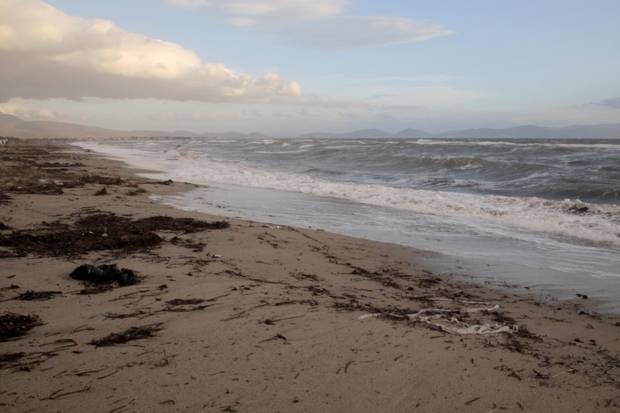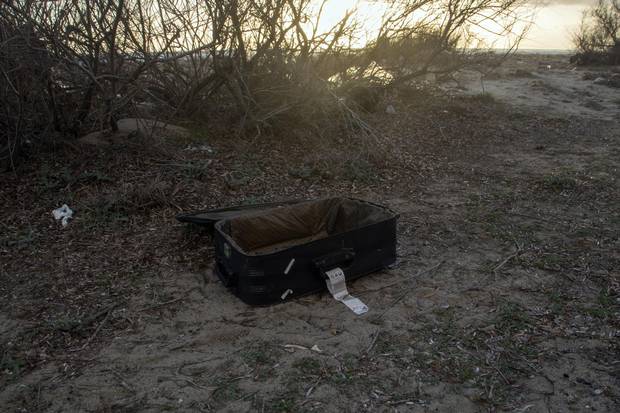They were different Turkish beaches this time, and many more bodies on them. Thirty-six in total – refugees from Syria, Iraq and Algeria who died in the early hours of Jan. 5 when two dinghies capsized in the choppy stretch of the Aegean Sea between the coast of Turkey and the Greek holiday island of Lesbos.
Four months after the horror and sympathy generated by the photograph of three-year-old Alan Kurdi lying dead on the beach at Bodrum, another Turkish resort 375 kilometres south of here, the world isn't shocked any more. The focal point of concern has moved north, to Europe, and the challenges associated with integrating the million newcomers who arrived on the continent last year.
But 2015's refugees could prove to be only the tip of a very large iceberg. A thousand people a day have made the trip from Turkey to Lesbos over the first two weeks of 2016; more than 12,700 asylum-seekers arrived in Lesbos during the first 12 days of 2016.
By way of comparison, just 752 made the crossing in all of January last year.
And many of these latest arrivals continue to die before reaching their goal: At least 39 people have drowned this year in this corner of the Aegean Sea alone.
It's January, the wind is high, the waters are a frigid 15 degrees (hypothermia is a risk whenever water temperatures are below 20), and the waves are angry. On Monday, it was three Afghans – two women and a five-year-old girl – who died when a smuggler's speedboat flipped over. Like the 36 people who washed ashore here the week before, no one knows their names.
"The world is no longer interested," says Nilgun Kaya, a journalist based in the coastal town of Ayvalik. She followed Turkey's gendarmerie to the nearby beaches on Jan. 5 and photographed the grisly scene of bodies washed onto the wet sand.
One of her photographs shows a young boy face down, half-submerged in the surf. In another, two young women lie dead a few metres apart.
The latter photo was posted on the Facebook page of the local newspaper, Ayvalik Haber, but where Alan Kurdi's photo briefly took over Twitter and Facebook last fall, and eventually made front pages around the world, Ms. Kaya's photograph has been shared just 88 times on social media.
Ms. Kaya, who says Turkish police haven't released names of the refugees she photographed, compares the fading interest in their plight with media coverage of an earthquake somewhere far away. "People talk about it for a week or two, then they go back to their lives and forget about it."
But the refugees keep coming. Their determination to make the crossing to Greece, despite the winter weather, is an early signal that the European Union could face an even larger influx this year.
As a reference point: Last October, refugee arrivals swelled to as many as 10,000 a day.
Turkey's coast guard says it has intercepted 34 migrant boats en route to Lesbos so far this month, apprehending – and often rescuing – 2,000 people mid-crossing.
There's a whack-a-mole pattern to Turkey's attempts to crack down on the refugee routes and the people smugglers who profit from them. In September, authorities started shooing refugees away from Bodrum after the negative publicity that followed Alan Kurdi's death. The route between Bodrum and the Greek island of Kos became less travelled, and smugglers began moving refugees farther north, to lesser-known resort towns like Ayvalik and nearby Dikili instead.

Lesbos is visible in the background from an olive grove across the street from the beach near Ayvalik, Turkey. Refugees presumably sheltered here before attempting the crossing to Lesbos.
Now, in the wake of the Jan. 5 tragedy, Turkey is cracking down here, forcing the refugees and their handlers to find yet another route. An olive grove across the street from a beach south of Ayvalik is littered with evidence of those refugees who were camping there just a few days ago, waiting for their turn to get on a dinghy bound for Greece. But there was no one to be found there this week.
Dozens of burnt-out campfires dot the grove, surrounded by cardboard boxes that once contained newly bought outboard motors, life jackets and air pumps, accompanied by instruction manuals for how to use them. Scattered about are abandoned backpacks, clothing and even children's toys – items likely discarded by families told to reduce their luggage before being allowed on dinghies that are often packed with 30 or 40 people.
From the gently sloping olive grove, Lesbos – the edge of Europe – is clearly visible in the distance. Just 20 kilometres away across the unpredictable waters, it almost looks within swimming range. You can also see a gendarmerie base near the beach, raising the question of how hard Turkish authorities were working to stop the people smuggling before this week's crackdown.
Police here say word has finally gone out that the refugees need to find, again, an alternate way into Greece. A pair of soldiers checked all cars headed north toward Dikili and Ayvalik from the nearby city of Izmir, a major transit hub for refugees.
"Lately a decision has been taken that refugees are no longer welcome here," a police officer in Ayvalik says, speaking on condition of anonymity.
Although two men described in Turkish media reports as human traffickers were arrested in connection with the Jan. 5 deaths, the police officer denies there is a network of people smugglers working in the area, or any police co-operation with them. He claims that those crossing from the Turkish coast to Lesbos have largely been self-organized groups.
The police officer acknowledges that the crackdown in Ayvalik will likely only push the refugees to try reaching Greece from another part of the Turkish coast. "Often, a person is stopped trying to reach Lesbos and gets sent back to Izmir. Then they make another attempt and another attempt. How can we possibly control 100 per cent of what is happening on beaches that are 35 or 40 kilometres long? And this isn't our only task. We have other things to do as well."

A child’s trousers, abandoned in the olive grove near Ayvalik.
The numbers in Lesbos reflect the crackdown. New arrivals fell from 1,878 on Sunday and 1,540 on Monday to just 252 on Tuesday – when the sea was dangerously choppy – and 368 on a calm-weather Wednesday, according to the United Nations High Commission for Refugees.
But few expect the slowdown to last for long.
"Where there's a will, there's a way," says Abby Dwommoh, an Ankara-based spokeswoman for the International Organization for Migration (IOM). "Until the root causes are addressed, people are going to continue to find a way to reach a safe place where they can provide for their families. Until the root causes are addressed, we're going to continue to see this mass movement of people."
The root causes, of course, are the conflicts roiling Syria, Iraq and Afghanistan, countries the IOM says accounted for 88 per cent of 2015's refugee arrivals in Europe. And solutions appear a very long way off.
A Jan. 25 peace conference on the five-year-old war in Syria, which accounted for 55 per cent of last year's refugees, had little chance of succeeding even before Saudi Arabia and Iran, the main Sunni and Shiite powers in what is increasingly a region-wide sectarian conflict, severed diplomatic ties earlier this month over Riyadh's execution of Shiite cleric Nimr al-Nimr, and the subsequent storming of Saudi Arabia's embassy in Tehran.
Iraq's fate has been intertwined with Syria's ever since the so-called Islamic State (IS) declared a caliphate spanning swaths of both countries. Chunks of Afghanistan, meanwhile, are sliding back under Taliban control, while IS is also a growing presence in the country.
The constant flow of refugees and migrants is raising tensions between Turkey and the EU, which recently agreed to pay the Turkish government €3-billion ($4.7-billion) in exchange for more help deterring refugees from reaching Europe.
European Commission Vice-President Frans Timmermans travelled to Ankara last week to tell the Turkish government that the EU was "a long way from being satisfied" with Turkey's efforts to keep refugees from travelling to Europe. "The only benchmark is to bring figures down. Over the past weeks, figures remained relatively high, so there is still a lot of work to do there," Mr. Timmermans said.
In addition to the showy crackdown around Ayvalik, Turkey unveiled a policy change this week that could have a longer-term impact, announcing it will allow many of the 2.2 million Syrian refugees registered in the country to apply for work permits.
Aid workers say the inability to make a legal living in Turkey has been a major factor driving refugees to risk their lives trying to reach the EU.
But Syrians are only part of the refugee tide. Ms. Dwommoh says the early statistics for 2016 suggest Afghan refugees make up a larger share of the total than they did in 2015. There's also believed to be an upsurge in migrants from other countries, claiming to be Syrian, hoping that will give them a better chance of gaining asylum in Europe or elsewhere.
"We do know that there is a substantial amount of document fraud," Ms. Dwommoh says.

The Black & White clothes shop in Izmir, Turkey, sells life jackets for refugees.
The mini economic boom created by the refugees passing through coastal Turkey is evident as soon as you step out of the train station in Izmir, the regional capital and Turkey's third-largest city. Just 100 metres from the station's main entrance on Fevzi Pasa Boulevard is Black & White – a store that, until last year, sold primarily sweaters and jeans to Turkish customers.
Now, the customers are mostly refugees, and the most popular items are the orange life jackets that sell for 40 to 75 lira (about $20 to $35) apiece, depending on the brand.
In the summer, Black & White often sold 300 life jackets a day. Winter has brought a drop-off in the trade, but staff say they still sell 30 on a good day.
It's not just Black & White. The neighbouring shop is a shoe store that also stocks life jackets, for 75 lira each, as well as children's sizes for 65 lira. Black & White's other neighbour is a clothing store that displays inflatable rubber rings – more suitable for floating on in a swimming pool than for crossing the choppy Aegean – for 25 lira, as well as waterproof passport holders for 20 lira.

Waterproof passport holders are for sale at an Izmir shop.
"Sales of T-shirts have stopped. Life jackets are the only thing we sell now," says Bahar, an Arabic-speaking store employee who explains to shoppers the difference in quality between the various brands of life jackets that Black & White sells. She tries to convince them to buy the more expensive ones, she says, but most refugees opt for the 40-lira models.
"Most of the people who come in are from Syria and Iraq, and a few from Palestine," Bahar says. "But increasing numbers are from Pakistan and Afghanistan. Now, Iranians are starting to come, too. We hadn't seen them until recently."
Bahar's boss, Farhad Kobane, says he doesn't mind his staff speaking to a foreign reporter, because he's confident the life jackets sold at Black & White are real and thus helping to save lives. Down the street – where the price of life jackets falls below 30 lira – shopkeepers are immediately hostile to questions about their wares.
"It's haram [forbidden in Islam] to sell the fake ones," says the owner of a jeans shop, who also claims the life jackets he sells are real, though he wouldn't give his name. "I don't want to feed my children with money made from sin."

An abandoned package for a child’s inflatable arm rings lies on Dikili beach, north of Izmir, Turkey.
Lurking in the background of the Izmir markets are the human smugglers who arrange the refugees' transportation to Dikili and Ayvalik, and then onward to Lesbos.
"The smugglers arrange everything, from the drop-off point in Izmir to the Greek islands," according to one Izmir taxi driver, who says he regularly picks up refugees at the local airport and lends them his mobile phone so they can call the smugglers to arrange a meeting place. "There's nothing amateur about this. The smugglers always keep their promises."
Locals say the business is run by the long-standing crime syndicates, many of whom simply switched from smuggling goods to people when the refugee crisis began. "Even if I knew who they were, I wouldn't tell you where to find them," says Vesel Erdogan, a 43-year-old mobile-phone vendor who sells Turkish SIM cards to refugees passing through Izmir. "These people kill to protect their business."
The crackdown has spread as far as Izmir. Taxi drivers in the city say they've been warned they will be arrested if they're spotted – either by police or on traffic cameras – carrying refugees beyond the city limits.
Nonetheless, a new refugee route is already emerging from somewhere new along the coast. Médecins sans frontières (Doctors Without Borders) reports that a mini-flotilla of 26 boats packed with refugees reached lesbos on Thursday morning.
And on the Turkish side, nine more bodies washed ashore. Once more, no one knows their names.

Dikili beach, north of Izmir.
Mark MacKinnon is The Globe and Mail's senior international correspondent, based in London.
MORE READING ON REFUGEES
Absolutely nothing has changed’ since Alan Kurdi: Mark MacKinnon on the ground in Turkey
2:43





